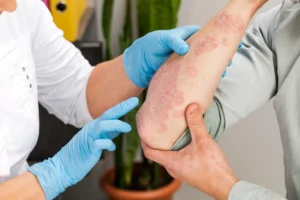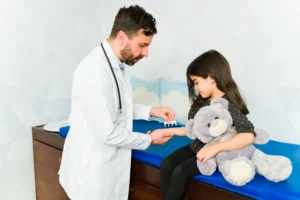Table of Contents
When do you need a food allergist, where do you find a food allergist, and how do you find a food allergist? Learning that your child has a food allergy can be an overwhelming, and even scary, time. There is a steep learning curve to the world of food allergies and parents may feel pressured to learn it all, all at once. However, the real key to being a well-informed and confident family with allergies lies in finding the right pediatric food allergist to help you navigate the allergy lifestyle and keep your child happy and thriving.
But with so many options out there, how do you know where to start and how can you find the right combination of expertise, caring, convenience, and collaboration to reach the best possible outcomes of allergy management and quality of life for your child? How do you decide on the right doctor for food allergies? Your initial thought may be that any allergist will do as long as they are qualified, but there are actually many other factors that go into finding the best experience. It’s about more than credentials — it’s about finding someone who truly understands your child’s unique needs. Here are a few things to look for when searching for the most comprehensive pediatric allergist available..
Care of the whole person
This goes for any healthcare specialty, and allergists are no different. When caring for a child with food allergies, your provider should be doing just that, caring for the whole child. They are not just a disease process to be managed, but a growing human with emotional, social, and psychological needs in addition to management of their food allergy. Living with a food allergy extends far beyond simply avoiding the allergen or managing reactions; it involves allowing kids the freedom and confidence to experience a normal childhood, enjoy food, learn, play, make friends, and not have to live their lives centered around allergies. Even just the act of determining what to feed your child, with developmental-appropriate foods and normal childhood pickiness taking center stage, is a challenge that should be included in comprehensive care. Fear, anxiety, or even depression symptoms may occur in children with prior severe reactions or whose quality of life has been negatively impacted by their allergies. These issues need to be addressed just as much as the allergy itself, and comprehensive care involves tackling any mental health concerns that may accompany the allergies. The right pediatric allergist can guide your family through all of this and more, with your child’s success and safety as their ultimate goal.
Care coordination
A child with food allergies has a lot of needs, beyond just diagnosing and managing the allergies themselves. The right food allergist will be able to offer or connect you with a broad range of services, including things like access to dietitians, mental health professionals, support groups, etc. Ideally, any concerns stemming from your child’s food allergies can be handled within the same organization, reducing wait times and insurance issues that accompany outside referrals.
Collaboration
Not only does a great quality food allergist have the ability to connect you with additional resources, but the allergist should also engage in a collaborative relationship with the rest of your care team. Your child’s healthcare providers should function as a team, with dieticians, doctors, nurse practitioners, psychologists, and more being able to collaborate and discuss your child’s case easily. This approach allows multiple experts to give input and create a holistic plan of care with your child at the center, without dealing with poor communication or a “too many cooks in the kitchen”-type scenario.
Convenience and accessibility
In the current age of modern technology, you should be able to connect with your child’s allergy team easily and from just about anywhere. You should have access to telehealth allergy or an online allergist when needed. Of course there are times when your child will need to be seen in person, and the importance of physical exams should be taken seriously. But if the pandemic-era lifestyle has shown us anything, it’s that many things can and should be done from home for both convenience and accessibility, and your child’s food allergy care is no different. You should be able to talk to a food allergist online or have an option for virtual allergy care as needed. Particularly for families who live in rural areas far from the nearest specialist, the ability to carry out some of the appointments via telehealth removes the financial and time management strain of traveling and improves compliance and outcomes.
Virtual-first healthcare
There can be many appointments with a variety of professionals when managing food allergies and it can be easy to feel like your child always has an appointment. By making allergy telehealth widely available (and even preferred), this can relieve the stress that comes with taking care of a child with food allergies as well as improve the overall quality of life of your family. A virtual-first allergy care model gives you continuous access to your child’s food allergist through technology such as your smartphone or computer. This ability for remote food allergy care maximizes the quality and effectiveness of care you receive from your child’s allergy care team while making patient care easily accessible to you and your family.
Supportive community
Having a child with food allergies can feel very isolating and you or even your child may feel like you are the only ones in the world dealing with this while other children freely accept treats or snacks at school, daycare, and birthday parties. Often, connecting with others living a shared experience can be so validating and therapeutic for parents and children alike. Access to a supportive community, through virtual or real-life gatherings or events is an above and beyond feature of a high-quality allergist. Who better to connect people living similar lives than the team of people caring for them? Look for a food allergy team that can connect you to other families with the same concerns, offline and online.
Family-centered
A quality allergist has your child at the center of the treatment program, but what about the family? Living with allergies always affects the entire family. Food must be labeled and stored a certain way; restaurants, birthday parties, and going to other people’s homes must be handled with caution and planning; and, even vacations require immense effort to avoid accidental exposure. So while it may seem that the only one affected is the child with food allergies, in reality the way of life for parents and siblings revolves around those food allergies as well. Parents may feel stress, anxiety, or frustration with always managing everything to make sure it is safe. And siblings may feel resentment when things are different or difficult or may even feel extra pressure to safeguard their sibling and help them avoid allergens. A great pediatric food allergist will know all of this and keep it in mind when helping plan your family’s care, connecting parents or siblings with support systems or resources if it becomes apparent they are struggling. Ultimately, a good quality of life for the allergic child means a good quality of life for the family dealing with food allergies and food allergy treatments.
Partners in care
Expanding on taking care of the family, it is important to find an allergist that understands parents or caregivers want to feel included in their child’s care. Meal plans that don’t work with your budget or lifestyle, or treatment options that don’t feel like a good fit can easily make a parent feel like they are not included in the choices being made about their child. Feeling left out can leave families frustrated, confused, or even disengaged in their care. If that starts to happen, sometimes people will even stop going to their appointments or following their treatment plan, which puts your child at risk of a serious reaction. This is why partnering with children and their families is the hallmark of a great food allergist including a virtual care allergist or telehealth allergist. The plan of care has to make sense to you, feel good to you, and fit with your family or it needs to be reworked until it does.
Embraces diversity
It is important to find a pediatric food allergist who understands different ways that food allergies might impact families of different races, socioeconomic statuses, family structures, or backgrounds. A quality allergist will be able to identify these factors and work with families to set health goals that align with their unique family.
Strives for health equity
Similar to recognizing diversity, an equity-conscious allergist will understand that factors such as race, gender, socioeconomic status, sexuality, gender identity, or others might affect how a family handles food allergies, their ability to attend appointments or adhere to treatment plans, and even their trust in the healthcare system. When searching for the right allergist, you can even ask them about their experience with diverse populations or how they handle certain differences your family identifies with. Their ability to listen and be sensitive to lived experiences should be easily evident within a first appointment, in-person or telehealth, and you reserve the right to not continue with someone who does not make you feel comfortable.
Culturally competent
The way that families prepare, consume, and think or feel about food can vary greatly across cultures. Planning around food allergies will never be a one-size-fits-all endeavor and your family’s unique cultural needs should be at the center of the discussion. Whether it is groups of foods that are heavily present in your diet, or ones to be strictly avoided, kosher rules to adhere to, fasting considerations, or even where you get (or grow) your food, a quality pediatric food allergist will consider it all and create a plan that focuses on and understands those needs and preferences. If English is not your primary language, interpreters should be available to help translate during the visit; food allergies are serious, and information being lost in translation leaves room for misunderstanding and dangerous errors. Cultural competence also applies to family structure and acknowledging who lives at home and who is primarily responsible for making decisions (health-related or otherwise) in the home. You want to leave your allergy appointment, virtual or in-person, feeling heard, respected, and understood as a partner in your child’s food allergy care.
Cutting edge treatments
Much has changed in the last few decades with allergy management and quality of life measures becoming increasingly important. In order to get the best results for your child, you will want to find a pediatric food allergist who is always learning and expanding their knowledge base to keep up with the latest research and treatment options. As new evidence unfolds, the options for your child may expand, but it can be tiring to try to find someone up on the latest trends in allergy management, or conversely, it can be uncomfortable to bring new information to your food allergist and have them learn along with you. Ideally, your allergist will already be keeping tabs on research, novel therapeutics for food allergy, and updating their practices frequently, providing up-to-date and evidence-based care to your child.
Easy communication
Gone are the days when you needed to wait on hold for hours to get through to your child’s provider, or give your information multiple times to multiple people before you talk to someone who knows your child. Modern technology makes it much easier to communicate questions or concerns directly with your child’s care team, especially in a virtual-first allergy care. You will want to find an office that offers portal messaging; this is directly attached to your child’s chart so the healthcare provider receiving the message can easily and quickly review their information when viewing your message, and other members of the healthcare team can see these communications as well, keeping everyone on the same page and aiding that collaborative approach to their treatment. Obviously, your child’s team may not be available 24/7, unless it is a virtual-first healthcare team, and there are always emergency departments for more urgent or emergent care, but a good sign of an efficiently working healthcare team is a short response time to routine questions or concerns. Easy communication, in all forms helps in the management of pediatric food allergy. And parents and caregivers who have a seamless encounter with the food allergist and other food allergy health professionals are more likely to succeed in managing their child’s food allergies.
Regular appointment intervals
Nothing feels quite as scary as being given a new treatment or medication for your child, as well as a lengthy packet of new information, and then being sent home with no specific follow-up scheduled. Or worse still, working with a telehealth pediatric allergist with limited virtual availability. So much changes so quickly, especially with children who are always growing, changing their activities, and adjusting their food preferences. It feels much more reassuring and safe to have regular follow-up appointments scheduled every few weeks or months and having the ability to change that frequency as your comfort allows. You should always ask about the next appointment and know when you can next address any non-urgent changes or concerns. This is often easier to do with telehealth practices due to the expanded availability of the team of doctors, dieticians, nurses, certified coaches, and other healthcare practitioners associated with your child’s food allergy care.
Ease of getting an appointment when you need it
We’ve all had the experience with our children where they wake up in the morning with a fever or sore throat and you call the pediatrician as soon as they open, only to find that they are booked solid for the next few days! It seems primary care offices are just overrun (or understaffed), and as a result, patients are redirected to urgent care clinics and emergency rooms unless they are able to wait for days or even weeks to be seen. This involves explaining details to a complete stranger who you may not even feel comfortable with and needing to trust their recommendations, all while dealing with the stress of a sick child. There is hardly room for this struggle with specialist care and something as sensitive as food allergies, so a key component of quality allergy care is the ability to get acute or urgent appointments, or unexpected checkups, quickly when you need them. Ideally, same day appointments would be possible, or at the very least getting in within a day or two of calling with your concern. You can ask an office (even a telehealth practice) about their policy concerning urgent appointments while you are searching for the right healthcare provider for your child. Most virtual-first allergy care teams or telehealth practices or telemedicine service providers are often able to schedule follow-up appointments sooner than in-person practices.
Affordability
Regardless of if you have commercial insurance, Medicaid, or are completely uninsured, your child will need some form of treatment plan for their allergies. The right to avoid a life-threatening reaction does not just lie with those who can afford to see a specialist; understanding and addressing disparities in food allergy care and food allergy management will minimize the chances of socioeconomic status becoming an obstacle in food allergy care. A quality allergist office, virtual or in-person, will accept major insurance company plans, including Medicaid programs, and offer a sliding scale fee schedule based on income for families without insurance. Payment plans should be explained up front, including information on how soon after an appointment you will need to pay. Some offices may even offer charitable services for certain families who qualify. You should know ahead of time how much regular visits and possible testing may cost so you are not left with surprise bills you cannot afford. A competent and caring billing department is a must.
Evidence repeatedly shows that the level of connection, trust, and comfort patients experience with their providers has an impact on how compliant they are with their treatment and the quality of their health outcomes. This means that finding the right allergist for your family is not just preferable, it’s necessary to achieving the best outcomes and keeping your child safe, healthy, and with the highest quality of life possible. Modern technology means that you no longer have to just accept the first person you are referred to or whose office is nearest your home. You can now do a deep dive on the internet and explore a variety of telehealth facilities, their mission and vision, what they offer, and how they might be the right fit for your family. Listed above are just some examples of what you might want to look for, and each family can add their own priorities as they see fit. Just remember that something with as big an impact on everyday life as food allergies deserves the time and attention needed to help you feel comfortable and confident in your child’s pediatric allergy care.











